cargo
counts Turkish Foothold
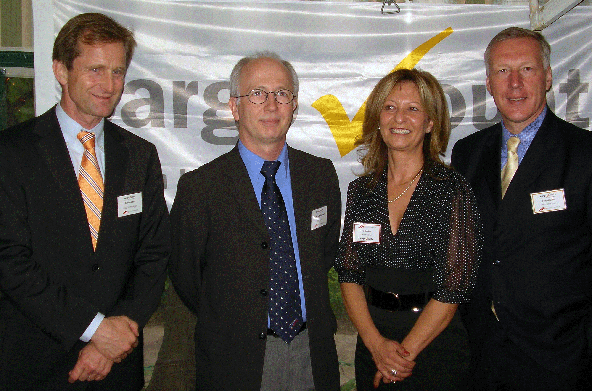 What
counts is air cargo. Pictured in Izmir this week (L to R) Paul
Schwaiger, managing director SunExpress, Peter Kolb, Consul General
Germany at Izmir/Turkey, Nursel Gueven, co-owner of Turkish GSA
SPAviationServices and Michael Stoermer, director commercial cargo
counts GmbH. What
counts is air cargo. Pictured in Izmir this week (L to R) Paul
Schwaiger, managing director SunExpress, Peter Kolb, Consul General
Germany at Izmir/Turkey, Nursel Gueven, co-owner of Turkish GSA
SPAviationServices and Michael Stoermer, director commercial cargo
counts GmbH.
|
On the face of it, air cargo
tonnage has not been too hot an issue for Turkish leisure carrier SunExpress
so far.
In fact, cargo only contributes about one
percent to the carrier’s total revenue of €302 million euros,
the Antalya-based airline posted in 2007.
"However, as far as our profits are
concerned cargo accounts for up to seven percent," states general
manager Paul Schwaiger of SunExpress.
Now in a world that looks at utilizing all
available space whether above or on the ground, boxes and containers are
getting some additional drive for the 1989 founded German-Turkish JV that
belongs to Turkish Airlines and Deutsche Lufthansa (50/50%).
"We expect a number of new incentives
in this field," confirms Ersin Aydin, SunExpress head of cargo.
Last year the airline that presently operates
a fleet of fourteen B737-880s and three B757-200s reported a total of
1,200 tons on flights from Turkey to Western and Central Europe, mostly
Germany, Switzerland, Austria and Poland.
Until 2010 the fleet will grow to 25 aircraft,
confirms Herr Schwaiger.
Responsibility for renewed energy in the
air freight business at the Turkish-German airline is agent, cargo counts
(CC).
Established in 2003 the subsidiary of Lufthansa
Cargo (100%) offers total cargo management solutions for third-party airlines,
including sales, booking, handling and related services.
Consequently, cargo counts acts like a virtual
airline without possessing any aircraft.
In addition to SunExpress cc serves carriers
such as clients like German leisure airline Condor, regional carrier Croatia
Airlines and Portuguese EuroAtlantic Airways in its portfolio.
"In mid-May we will definitely name
another airline," Michael Stoermer cc's director commercial told
Air Cargo News FlyingTypers.
To fulfill the daily cargo business here
in Turkey, cargo counts collaborates with a number of local GSA’s
who supply both the necessary market knowledge and direct access to the
shippers with whom they have a close working relationship.
"In Izmir, for instance there are a
substantial number of textile producers, car suppliers and IT related
enterprises that rely on air transport," says Germany's General Consul
Peter Kolb who has been based at the beautiful 3.5 million population
city in Turkey for the last three years.
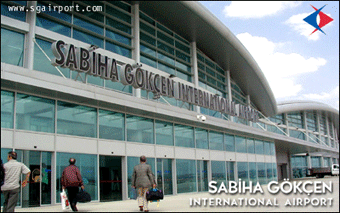 To
approach those industries and hopefully generate more cargo flow is the
job of newly-founded SPAviationServices with which cargo counts has just
inked a contract. To
approach those industries and hopefully generate more cargo flow is the
job of newly-founded SPAviationServices with which cargo counts has just
inked a contract.
As for SunExpress this means that Nursel
Gueven and her team are now responsible for filling the bellies of the
carrier on each flight from Turkey to international destinations.
Not part of this deal however, are domestic
services of the carrier such as flights from Istanbul to Antalya that
are marketed by the SunExpress mother company Turkish Airlines Cargo directly.
"Nursel is a perfect match since she
knows the Lufthansa world pretty well," lauds Herr Stoermer.
In fact Nursel, the co-owner of SPAviation
('SP'-stands for 'Sales Professionals') worked for the German carrier
for 28 years in the airline's Istanbul and Izmir branches, and for 13
exclusively in air cargo.
cargo counts' decision to hand over the
selling of air freight to Nursel's SPAviation agency is quite a radical
change to the former concept where Lufthansa Cargo was responsible for
marketing the entire belly-hold capacity of SunExpress out of Turkey.
But maybe no surprise here, as the former
strategy did not really pay off very well, admits manager Stoermer.
"The key problem was that they centralized
the sales function at the Istanbul office at Ataturk Airport.
But what we need are tailor made transports
and service solutions for our clients that can only be developed together
with shippers through every day contacts."
This brought SPAviation into the game since
the agent operates local offices at all three Turkish airports. SunExpress
offers international flights at Istanbul's Sabiha Goekcen, Izmir and Antalya.
As a consequence of cargo counts' strategic
shift in Turkey "we expect double digit growth rates of
our air freight business in the months to come," Ersin Aydin said.
Heiner Siegmund
UPS Ups Two Women In Europe
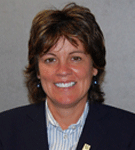 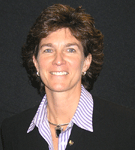 Romaine
Seguin, (left) a 25-year veteran of UPS who has been leading the
company’s South Europe District, has been promoted to vice
president of operations for UPS’s entire Europe Region. Romaine
Seguin, (left) a 25-year veteran of UPS who has been leading the
company’s South Europe District, has been promoted to vice
president of operations for UPS’s entire Europe Region.
Ms. Seguin will be responsible for
small package operations in 47 countries and territories throughout
Europe, the Middle East and Africa.
Cindy Miller, (right) a 20-year
veteran of UPS who headed the Metro Chicago District, has been
named vice president of operations for the company’s South
Europe District.
Miller will be responsible for small
package operations throughout Italy, Spain, Portugal, Greece,
Bulgaria, Romania, the Balkans, the Middle East and Africa
Big move for small packages in Europe
for UPS.
Putting a good face on that business
can’t hurt either
|
Recalling A Rome
Humdinger
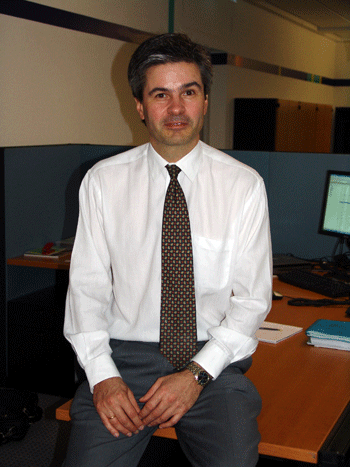 Aleks
Popovich IATA head of Cargo sums up the big World Cargo Symposium
that took place March 3-6 in Rome like this: Aleks
Popovich IATA head of Cargo sums up the big World Cargo Symposium
that took place March 3-6 in Rome like this:
“I feel through our experience
in Rome we've made a great breakthrough as a supply chain, in engaging
with the voice and needs of our true customers. “Through
this dialogue we've confirmed the importance to our customer of
addressing supply chain issues: cost via e-freight, reliability
via Cargo 2000, and integrity via our new work on secure freight.
“It’s also clear we have
a critical job to do in promoting well-researched facts and actions
we must take for air cargo and the environment.
“The customer dialogue has really
just begun.
“We intend to take it through
to our March 2009 symposium in Thailand.”
The message that air cargo industry
must unite to work for the common good, and has established the
path to do so through IATA’s World Cargo Symposiums, was the
new reality.
While the organization’s messages
of simplifying and listening to customers may seem self evident
for any business, when every party involved in the air cargo industry
has a different interpretation of what that means, there can be
some deviations or lack of efficiency.
IATA’s working to get everybody
on the same page through discussions and panels of experts that
should steer the future agenda of how to improve air cargo, spelling
out what concerns everyone has and what needs to get done, and to
continue producing symposiums that will right the industry on the
same path of change. Next year’s event will be in Bangkok,
and will not only listen to the voice of the customers, but go a
step beyond and include more actual customers in the discussions
that will shape the future of air cargo, IATA said.
“(This symposium), we did a
survey of participants to get a whole cross section of customer
feedback, and one of the risks of that was: ‘What on earth
would they say?’” said Aleks Popovich, IATA’s
chief of cargo, speaking about Rome 2008. “I think the good
news is that it confirmed that we’re on the right track with
our agenda of E-Freight, saving costs, Cargo 2000, increased reliability,
security, safety and the environment (agendas),” he said.
“Getting the carriers and forwarders
to agree that collectively we need to collaborate in having more
customer dialog has been one of the big outcomes of this event,
to the extent that we’re now agreeing to have a customer forum,”
Mr. Popovich said.
“We’re already planning
for next year when we have the Cargo Executive Summit. So for the
first time, we move in step. The cargo summit two years ago was
just airlines, this year it was forwarders and airlines, next year
it will be forwarders, customers and airlines. It’s a natural
trend. If we don’t understand the voice of our customers,
change won’t happen, we won’t be united. It’s
very important,” Mr. Popovich said.
He said he’d heard that participants
at the Rome symposium were satisfied to see that IATA was taking
the content of the event and “doing something with it.”
“The commitments we’re
making this year are greater than last year. We want to stretch
our goals to succeed,” he said.
During the closing remarks in Rome,
Mr. Popovich thanked the participants, without whom, he said, the
current agenda wouldn’t have been established.
“This event didn’t happen
by magic,” he said. “I want to thank all of you for
taking precious time away from your offices. It’s thanks to
you that we shaped this agenda; we couldn’t have done this
if it weren’t for you participating in the various sessions.
It’s a great example of taking the energy that’s in
this room and translating it into action for the good of the industry.
I think this was time well spent. I look forward to seeing more
of you in Bangkok,” Mr. Popovich said.
George Frey
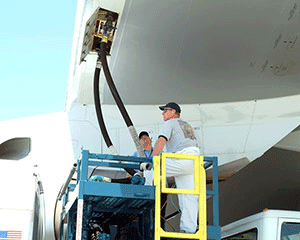 Quote
Of The Day Quote
Of The Day
 Airline
business confidence in current and future profitability weakened
sharply in Q1 2008. Airline
business confidence in current and future profitability weakened
sharply in Q1 2008.
For the first time since our survey
began in March 2005, expectations of changes in profitability
were, on average, negative.
Half of the respondents thought that
profitability had decreased in Q1, while over 61% expected
profitability to deteriorate further over the next 12 months.
High and rising fuel prices remain
a major concern, but the other half  of
a damaging “stagflation” scenario, i.e. weaker
demand, is also cited as a major worry for profitability.” of
a damaging “stagflation” scenario, i.e. weaker
demand, is also cited as a major worry for profitability.”
IATA April 30 |
Airbus Positive
China Forecast
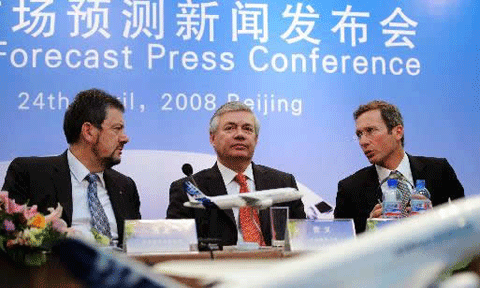
European plane maker Airbus forecasts
that the Chinese Mainland will need some 2,670 new passenger
aircraft and freighters from 2007 to 2026, with a total market
value of US$329 billion, representing 11.6 percent of the world
total demand for over 24,000 new aircraft in the next 20 years.
According to Airbus' 2007-2008
Global Market Forecast (China) issued late last month the Chinese
mainland will require more than 1,900 single aisle aircraft,
nearly 700 twin-aisles and 190 very large aircraft (VLA).
The number of VLAs, such as A380,
is forecast to be on the rise as international traffic from
and to China is to greatly increase and to be highly concentrated.
Air cargo transportation in China
is expected to grow six-fold and introduce some 130 new freighter
aircraft over the next 20 years, leading to an eleven-fold expansion
of its cargo fleet, from the current 45 to 471 in 2026 Airbus
said. Average growth rate for China’s domestic air cargo
market is estimated to be 10.5 per cent per year, and for its
international market is 8.5 per cent.
At the press conference, responding
to China’s ongoing widebody aircraft project, Laurence
Barron, president of Airbus China said:
“We give much attention
to China’s widebody aircraft project, but still don’t
get the detail, and more discussions are needed.
“If in the future, direct
competition emerges between China’s large aircraft company
and Airbus, our cooperation will be challenged.
Also at the press conference,
Airbus revealed its plan to launch a joint venture in China
to make aircraft components.
"We are studying the possibility
of setting up the venture with AVIC II (China Aviation Industry
Corporation II) and expect to finalize the deal as early as
August," Laurence Barron said, without elaborating._
Airbus expects to use the joint
venture to produce composite material parts for its Airbus A350
model.
As to Airbus’ development
in China, John Leahy, Airbus Chief Operating Officer Customers
said:
"In terms of in-service aircraft,
Airbus' share of the in-service fleet on the Chinese mainland
has already increased from 7 per cent in 1995 to the current
38 per cent. Our aim is to reach 50 per cent in 2012,"
"In the next 20 years, the
greatest demand for passenger aircraft will come from China,
second only to the United States," he added.
David |

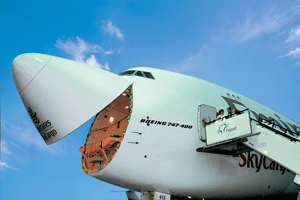 Boffo
Numbers From Emirates Boffo
Numbers From Emirates
Now that Emirates has released its
figures for 2007 the numbers reported show that Emirates SkyCargo
performed well with both revenue and tonnage increases during the
year.
SkyCargo carried 1.3 million
tons of cargo, up 10.9 percent over 2006.
Revenue
increased 20 percent to AED 6.4 billion ($ 1.8 billion), up from
AED 5.4 billion ($ 1.5 billion) in 2006-07.
Cargo
revenue contributed 19 percent to the airline’s total revenue.
SkyCargo features a freighter fleet
of 10 aircraft – five leased and five owned. In all, Emirates
said that it carried freight in 114 aircraft, including bellyhold
space in the passenger fleet, to 99 cities on six continents. |

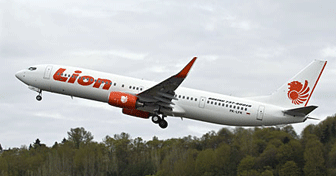 At
Boeing 6,000 B737s Is A Living At
Boeing 6,000 B737s Is A Living
Boeing and Jakarta-based Lion Air
celebrated the delivery of the airline's 10th B737-900ER.
The airplane helps the airline to
expand its service with new destinations throughout South and
Southeast Asia.
The B 737-900ER program was launched
in July 2005 when Lion Air announced the initial order for 30
aircraft.
Lion took delivery of the first
B737-900ER in April 2007.
To date Lion has ordered 178 of
the type.
But the stunning realization is
that since 1967 more than 6,000 B737s have been ordered by airlines
as Boeing has made a living from the twin jet. |

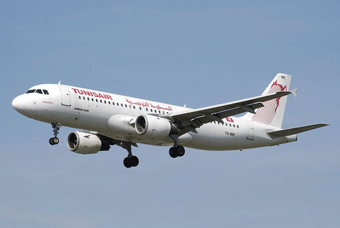 Wings
Over Africa Wings
Over Africa
Tunisair has signed a letter of
acceptance with Airbus for the acquisition of three A350-800s,
three A330-200s and ten A320s, as part of its major fleet development
plan.
Airbus says that Tunisair is the
third African airline to order the A350 XWB. Tunisair currently
already has 12 A320s, four A319s of which two have extended range
capability and three A300-600s in operation.
The A350 is expected to help the
carrier eventually spread its wings to North America. |

 Helping
Hand At handling counts Helping
Hand At handling counts
Annabel Schwätter is the new
Managing Director of Lufthansa Cargo, division handling counts
GmbH.
Christian Haug moves from MD handling
counts position to New York as Director Sales and Handling USA
Northeast and Mid-Atlantic.
Annabel Schwätter at Lufthansa
Cargo since 2000, has been hands-on holding handling positions.
Must mean that she can handle handling
counts, and somebody should give her a hand for that, don’t
you think?
|

AirBridge Adds Asia
To Russia
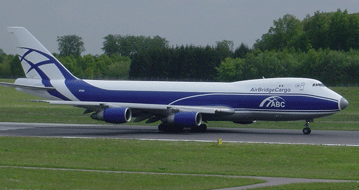 AirBridgeCargo
has launched non-stop services to Moscow from Shanghai and Hong
Kong Using the recently delivered extended range Boeing 747
freighters, ABC is the first carrier to ever connect Shanghai
and Hong Kong with Moscow by scheduled freighter service. AirBridgeCargo
has launched non-stop services to Moscow from Shanghai and Hong
Kong Using the recently delivered extended range Boeing 747
freighters, ABC is the first carrier to ever connect Shanghai
and Hong Kong with Moscow by scheduled freighter service.
The company hopes an edge of offering
fastest delivery times and no handling in-transit will appeal
to shippers as an ideal choice for such high-value and time-sensitive
commodities as consumer electronics, commercial samples, fashion
goods and luxury items—all in growing demand across Russia.
From Moscow, AirBridgeCargo offers
onward connections to Amsterdam, Frankfurt and Luxembourg.
With Beijing in North China and
Narita in Japan already connected with Moscow by non-stop scheduled
services, ABC has now doubled the number of origins in Asia
from where non-stop flights to the Russian capital are operated.
David
|
|



